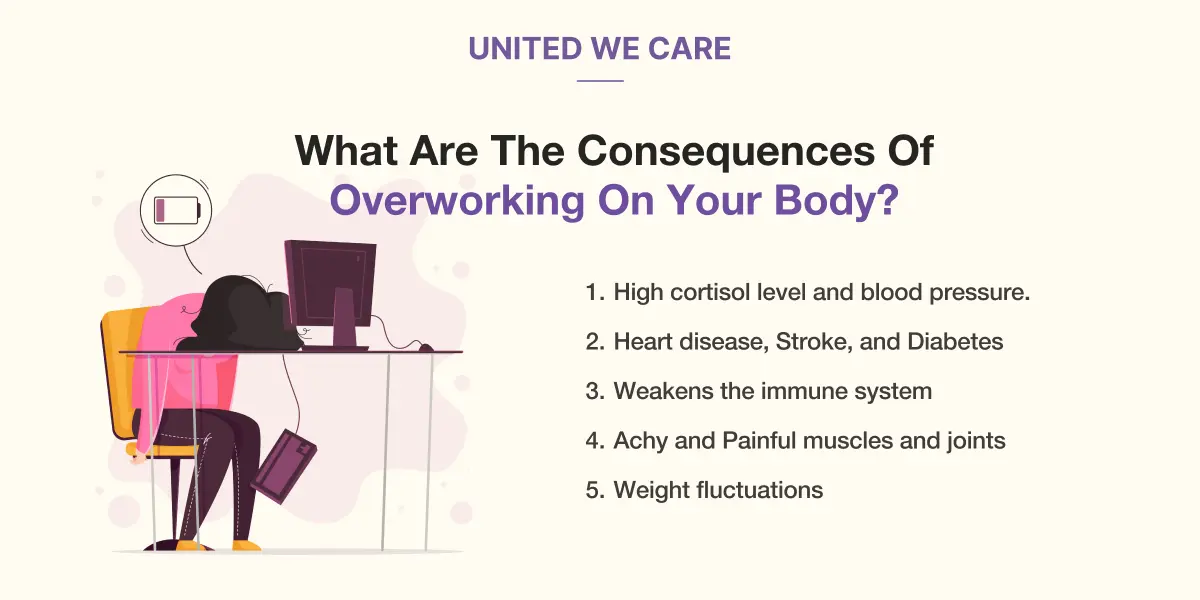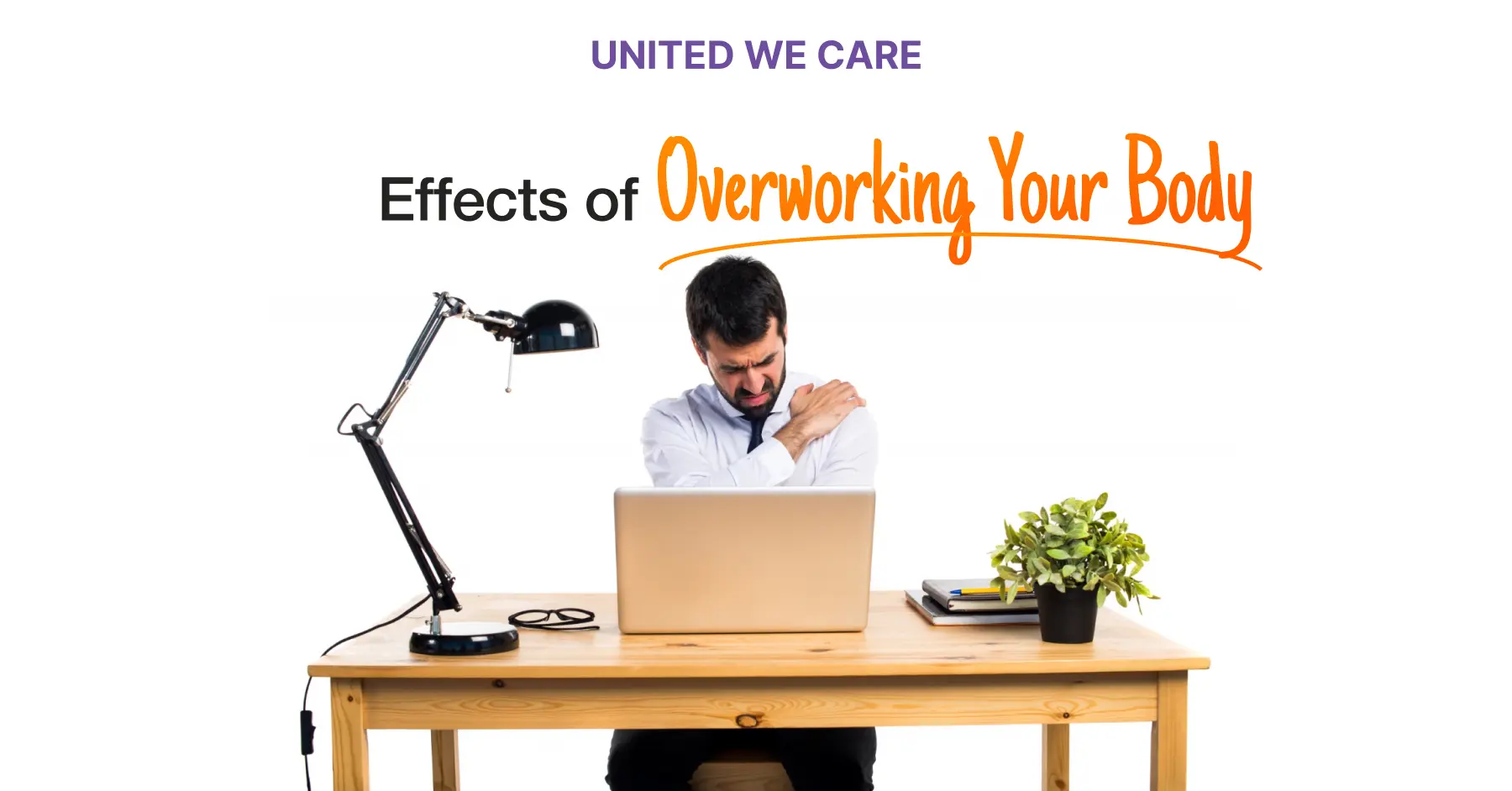Introduction
Overworking and pushing oneself excessively without adequate recovery, adversely impacts physical and mental health. It heightens stress, diminishes productivity, disrupts sleep, and contributes to chronic ailments. Beyond health, it jeopardizes personal and professional spheres, fostering burnout, discontent, and diminished performance. Mitigate overworking by respecting limits, incorporating breaks, prioritizing nutrition, hydration, and sleep, and seeking support when necessary.
Is Overworking Good?
Working too hard rarely pans out well. Sure, burning that midnight oil may seem noble, but overdoing it can mess with your health and actually stall your career. First up, overworking leaves you drained. So you may reach for risky crutches like one too many cocktails to take the edge off. And that can pave the way for some pretty scary health issues down the road.
Overworking can also backfire on the productivity front. Studies show that after 55 hours per week, you produce less and lower quality work than if you capped it at 40. Your mind just wasn’t built to churn on overload indefinitely. Last but not least, overworking can wreck your sleep, energy, and ability to handle stress. And who really needs that? Skimping on sleep hampers your problem-solving skills and makes it tougher to bounce back when you inevitably get sick.
The takeaway from this all is that ambition is great, but listen to what your mind and body are telling you. Building in time to refresh and recharge will only make you better at your job.
Consequences Of Overworking On Your Body
Going full throttle at the office can really do a number on your physical health. Science confirms that overworking can throw your body seriously out of whack.

- High cortisol level and blood pressure: For starters, sky-high cortisol levels from constant stress can cloud your thinking and jack up your blood pressure. Not exactly a recipe for wellbeing.
- Heart disease, Stroke, and Diabetes: Research also links overworking to increased risk for scary stuff like heart disease, stroke, and diabetes. Working beyond 55 hours every week seems to be the tipping point.
- Weakens the immune system: Overworking can also beat down your immune system, making you an easy target for bugs going around the office. So much for powering through with endless energy drinks.
- Achy and Painful muscles and joints: Let’s not forget achy, painful muscles and joints from physical exhaustion without enough rest.
- Weight fluctuations: Dramatic weight fluctuations from irregular work hours and grabbing whatever’s quick.
Your body needs balance to thrive. Giving it a break from the constant grind will keep you sharper, healthier, and feeling more like yourself. Listen when it’s telling you to slow your roll.
Effects Of Overworking On Your Mind
Overworking doesn’t just tax your body; it can also take a major toll on your mental health. Science confirms that constant grind can mess with your head.
- Chronic stress: For starters, chronic stress from overwork can pave the way for depression and anxiety.
- Emotional exhaustion: Emotional exhaustion and losing interest in your job or home life often go hand-in-hand.
- Burnout: Burnout is another mind-melter, making you feel overwhelmed, cynical, and ineffective at the office.
- Low Self-Esteem: It’s not exactly how you want to feel. Overworking can also trigger mood swings, negative self-talk, and low self-esteem. Feelings of frustration and guilt often come along for the ride.
And let’s not forget the struggle to balance work and social life. Isolation, detachment from loved ones, and lack of support are par for the course. Your mind needs breaks from the hustle, just like your body. Give it some R&R, and you’ll feel sharper, saner, and more like yourself. Don’t sacrifice your mental health in the name of ambition. Listen when your mind is urging you to slow down.
7 Tips To Overcome Effects Of Overworking Your Body
If you’ve been overworking your body, there are practical steps you can take to reverse the damage and restore your well-being.
- Firstly, schedule mandatory rest days after intense workouts and avoid working more than 40 hours per week. Your body desperately needs recovery time.
- Use your commute as downtime to relax rather than squeeze in more work. Give yourself screen-free breaks throughout the day to do calming activities like walking, stretching, or chatting with someone.
- Seek out communities beyond work and home that bring more balance to your life, like yoga, meditation, or a hobby you’re passionate about.
- Surround yourself with people who value rest. Make a focused to-do list each day and stick to the top three priorities.
- Multitasking and trying to do everything at once will just stress you out.
- If symptoms persist or worsen, don’t hesitate to consult a doctor, therapist, or coach. With professional help and determination, you can reverse the effects of overwork and regain your health.
- Listen to what your body is telling you and take action. There are always solutions if you’re willing to slow down and make your well-being the priority.
Conclusion
Overworking is super common, but it can seriously mess with your physical health, mental health, and personal and professional life. Working too hard can increase your risk for chronic diseases, tank your productivity, wreck your sleep, and lead to depression, anxiety, and burnout. Not exactly goals. The good news is overworking can be prevented and reduced. Working within your limits, taking regular breaks, and prioritizing nutrition, sleep, and hydration can help you avoid the harmful effects.
If you’re already in too deep, don’t panic. You can overcome overworking by taking some simple steps. Scheduling mandatory rest days, making reasonable to-do lists, giving yourself permission to take breaks, joining communities for support, and seeking professional help if needed can all get you back on track. Listen to your mind and body. They’re telling you to pump the brakes for a good reason. You’ll be healthier and happier if you find ways to put your well-being first, even when you’re ambitious.
There are always solutions if you’re willing to slow down and look for them. At United We Care, we have tailored solutions just for you, so click here and get a cure of the effects of overworking.
References
- B. Prasad and C. Thakur, “Chronic overworking: Cause extremely negative impact on health and quality of life,” Int. J. Adv. Microbiol. Health Res., vol. 3, no. 1, pp. 11-15, 2019¹.
- A. K. Jain, “Overwork and adverse effects on health,” J. Global Econ., vol. 4, no. 2, 2016².
- NIOSH, “Overtime and extended work shifts: Recent findings on illnesses, injuries, and health behaviors,” Center for Work and Fatigue Research, 2004³.
- A. J. Barnes, “Working overtime: The effects of long work hours on physician productivity and patient care,” Health Serv. Res., vol. 54, no. 2, pp. 494-503, 2019.
- A. K. Artazcoz, L. Cortès, J. Escribà-Agüir, V. Cascant, and C. Borrell, “Long working hours and health status among employees in Europe: Between-country differences,” Scand. J. Work, Environ. Health, vol. 37, no. 5, pp. 356-362, 2011.





